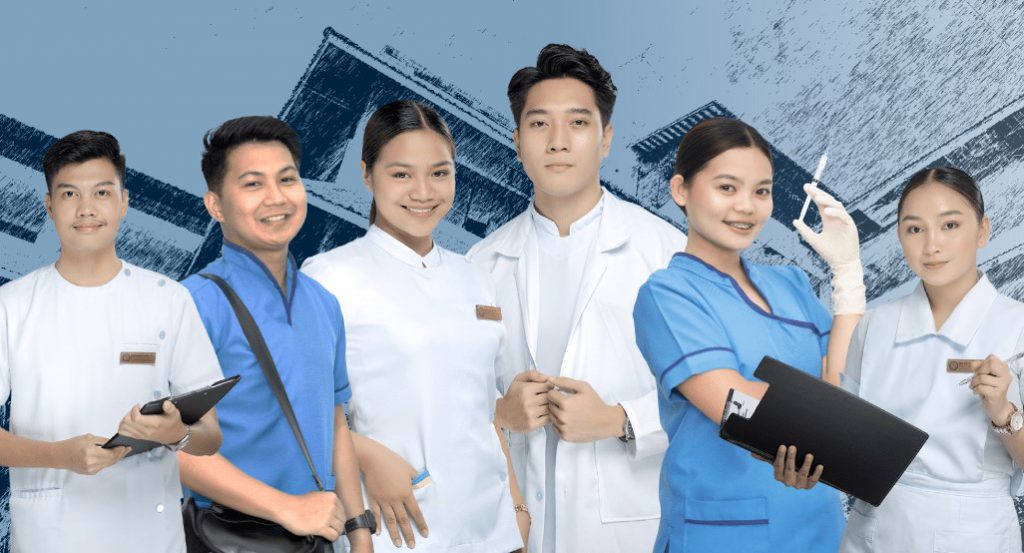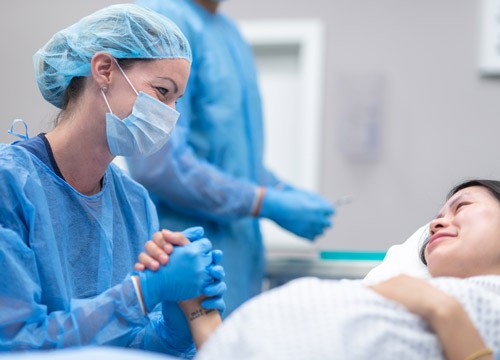About Us
As one of the academic units of the University of Northern Philippines (UNP), the College of Health Sciences (CHS) has evolved distinctively as it does today from what it was primarily created for. Prompted by the shared desire between the UNP administration and the Provincial Government of Ilocos Sur to establish the College of Medicine in UNP, CHS was designed to offer a Step Ladder Medical Curriculum to serve the preparatory year levels that lead to the Medicine Program. This started the rigorous authorization process that would permit CHS to fully operate as a legitimate academic institution and take advantage of the chance to manifest its relevance as a global partner in promoting sustainable growth and development.
The desire for the establishment of a medical school at UNP initially went the extra mile when the proposal made by then Regent Antonio R. Lahoz gained the full support of the UNP Board of Regents. It was able to smoothly advance under the scrutiny of the Provincial Board of the Province of Ilocos Sur. On October 17, 1989, Sangguniang Panlalawigan Resolution No. 180, which sought the establishment of the College of Medicine and the College of Law at the University of Northern Philippines, was unanimously approved.
In August 1991, the UNP administration, led by then President Dr. Dorotea C. Filart, held a consultation meeting with the key officials of the University of the Philippines, including the Dean of the College of Medicine. A similar activity followed in the same year during the Multi-Sectoral Consultation Conference, wherein the Step-Ladder Medical Program the University of the Philippines is offering on its campus in Palo, Leyte (UPSHS) has been recommended to serve as the curriculum model for the proposed Medical Program in UNP.
Hence, the passage of Sangguniang Panlalawigan Resolution No. 164 (December 1991), which endorsed the establishment of the Step Ladder Medical Curriculum in UNP, and UNP Board Resolution No. 08 (January 21, 1992), which, in principle, approved the establishment of the College of Health Sciences to offer the Step Ladder Curriculum of the Medical Course at UNP. As such, Sangguniang Panlalawigan Resolution No. 30 (March 3, 1992), which sought the establishment of the College of Health Sciences, was forwarded to the Office of then President Fidel V. Ramos through the Secretary of the Department of Education, Culture, and Sports (DECS). It succeeded the President’s approval on November 09, 1993, with the recommendation of then secretaries of the DECS and the Department of Health (DOH) (Sec. Armand Fabella and Sec. Juan M. Flavier, respectively).
To boost the status of CHS as a beginning academic unit, the Institute of Community Health was created, and the Institute of Nursing was integrated into the college. The former offers the Community Health Curriculum, while the latter offers the Nursing Curriculum. The College started formally operating as an academic entity in the school year 1992-1993. Although the Community Health Curriculum delivers Allied Health Courses in a step-ladder design, such as the Certificate in Basic Paramedics for Year Level I, Certificate in Midwifery and Community Health for Year Level II, Certificate in Advanced Paramedics for Year Level III, and Bachelor of Science in Nursing and Community Health for Year Level IV, the Nursing Ladder Program was by far more popular, leaving the Community Health Program lagging behind. Nonetheless, the College was still recognized by the DOH as one of its institutional partners advocating for the Alternative Health Sciences Education Program across the country.
Revisiting the purpose of the creation of CHS, necessary revisions to the Community Health Curriculum were made. The Step Ladder Medical Program was adopted by virtue of Board Resolution No. 41, Series of 1997. It replaced the Community Health Curriculum design, such that the Certificate in Health Aid is obtained for Year Level I, the Associate in Health Science Education for Year Level II, the Certificate in Midwifery for Year Level III, the BS Nursing for Year Level IV, and the Doctor of Medicine as the terminal program for Year Levels V-VIII. However, such a system could not last long. The Medicine Program, being classified as a distinct program equivalent to a postgraduate study, was better seen to appropriately operate as a separate academic unit, hence disintegrating the Medicine Program from the CHS effective SY 2011-2012.
This necessitated CHS to restructure, once again, its curricular programs, leading to the offering of the Certificate in Caregiving for Year Level I, the Certificate in Health Care Services for Year Level II, the Certificate in Midwifery for Year Level III, and the Diploma in BS Nursing/BS Community Health Management for Year Level IV. This has significantly expanded the student population of the college. However, CHS had yet to deal with a seemingly tougher challenge.
In 2014, the CHED recommended the cessation of offering the Nursing Ladder Program since the College of Nursing, which offers the Traditional Nursing Curriculum, has been operating uninterruptedly since its creation. The decision was solidified on the basis that no identical curricular programs shall be competing against one another in the same academic unit or university. This resulted in a sudden plunge in enrollment, putting the resiliency of the College to test.
Through the relentless effort of the CHS faculty, together with the unwavering support of the UNP administration, CHS was able to fully recover from the challenges it went through. It succeeded the offering of the Special Program in Bachelor of Science in Community Health Management, effective SY 2015-2016. The BS Midwifery Program (now Level I Accredited by the AACUP) was disintegrated from the BSCHM Step Ladder Program to operate as a separate curricular program effective SY 2014-2015, the same period when the Bachelor of Science in Medical Laboratory Science (BSMLS), now Level III Accredited by the AACUP, was initially offered in the College. A new curricular program offering, the Bachelor of Science in Emergency Health Services (BSEHS), the better version of the BCHM Program (currently retains the Level III Accreditation Status of the BSCHM Program), the first of its kind in the whole country, was initially offered in the SY 2021-2022 to completely replace the BSCHM Program in the SY 2024-2025. CHS was able to rise from the setbacks even stronger.
With a number of BS Midwifery graduates consistently landing in the Top 10 Board Passers at the Regional Level since 2017, inscribing CHS as one of the Top Ten Best Performing Schools in the 2023 Midwifery Board Exams across the country, the consistently good performance in the BSMLS Board Exam, and the positive feedback about the BSCHM graduates, the College of Health Sciences diligently does its job by rigorously expanding its horizons at greater heights, particularly in its mission of producing globally competitive and responsible health professionals.
The historic decisions made and the humble accomplishments obtained from past administrations to the present have earned a good reputation for the College of Health Sciences. Although acknowledged as one of the highest-performing academic units at UNP, CHS stays relentless in its quest for excellence in sincere service to humanity. Humbled by its achievements, it remains cohesive in upholding its goals and objectives, guided by its core values, in keeping with the UNP’s vision and mission. The indelible mark of effective leadership and a participative community continues to perpetuate the dynamic working relationship between and amongst its stakeholders.


Goal
To produce globally competent health professionals dedicated to the provision of quality health services guided by equality, respect for humans, the love of God, country, and environment.
Objectives
- Attain excellence and leadership among Instruction in the allied health professions responsive to the needs of the dynamic health system;
- Enhance scientific, clinical and community-based health researchers along local and global concerns for the improvement of the general health condition;
- Strengthen relevant extension services and help uplift people’s lives; and
- Improve production through optimal utilization of available resources geared toward self-reliance.
Our Extension Services
SAFER CHS (Sustainable Activities for Empowered and Resilient Community – Care for Human and Its System)
The flagship extension program of the College of Health Sciences, named “SAFER CHS” (Sustainable Activities For Empowered and Resilient community – Care for Human and Its System), aims to assist and empower communities to become more resilient to face health crisis and achieve optimal level of functioning. Activities for these aims include health education activities, seminars on health promotion and prevention of illnesses, wellness and nutrition, training on disaster preparedness and emergency health services, and other relevant skills for a proactive and sustainable development.
The three academic programs of the College also anchored their specific projects on SAFER CHS. These include the “Capability Building and Health Promotion for Women and the Youth” for BS Midwifery, “Building Community Resilience to Disasters and Health Crisis” for BS CHM/BS EHS, and the “Kalusugan Panatilihin, Healthy Lifestyle Ugaliin” for BSMLS. Under SAFER CHS, the College forged partnership through establishing memoranda of agreement for adopt-a-community and school program at Caparacadan and Villamar of Caoayan, Ilocos Sur and at Sived, Sto. Domingo, Ilocos Sur. Needs assessments were conducted, and the results was the basis for the planning and implementation of programs and projects in the recipient communities.
The “Building Community Resilience to Disaster and Health Crisis Project” of the BSCHM/BSEHS is focused on empowering and capacitating Barangay Caparacadan, on disaster preparedness, mitigation and prevention, response, and recovery and rehabilitation. It also aims to ensure safety in the community and capability building to members of the community to provide emergency interventions in times of disaster and health crisis, and other health promotion initiatives.
The BSCHM/BSEHS program conducted trainings on disaster preparedness cum lecture on violence against women, basic first aid, basic rescue techniques, and basic life support. The program also conducted training on emergency interventions and gender issues and disseminated faculty members’ research during the pandemic.
During interactions with some of the community participants of the different activities conducted, they stated that through these activities, they have learned mitigation activities that would help them be prepared and to limit the effects of specific hazards that may arise. They have learned and practiced the proper interventions for common emergency situations, the proper way of transferring or transporting accident victims to safe place or to the health facilities, and to ensure a safe home or environment to members of the community especially the vulnerable members across the life span. The disaster preparedness, basic first aid, basic life support and basic rescue techniques and mass casualty incidence training are most requested program by other agencies and communities.
The Bachelor of Science in Midwifery, through their extension project named “Capability Building and Health Promotion for Women and the Youth,” forged partnership with Sived, Sto. Domingo, Ilocos Sur as their adopted community. The extension project aims to empower and capacitate women and mothers the knowledge and skills in caring for pregnant mothers, infants, and children.
To ensure safety and health promotion to the vulnerable population, the program conducted activities like seminar-workshop on women empowerment, hypertension and diabetes, familial role and child care, reproductive health, child safety and parental concerns and responsibilities in child rearing, care for the vulnerable population especially the elders, health assessment and basic health skills.
Seminar-workshop on leadership and management cum gender and culture in leadership and care of pre-school children. The extension programs organized and implemented in Sived Sto. Domingo, Ilocos Sur developed deeper partnership between the community people and the program. It has helped the people particularly the Brgy. Officials, BHWs and leaders improved their knowledge and skills on health making them more responsible and equipped to serve the people in the community.
The “Kalusugan Panatilihin, Healthy Lifestyle Ugaliin” project of the Bachelor of Science in Medical Laboratory Science aims to promote, maintain and improve individual’s and community health by reducing morbidity and mortality due to preventable health problems, develop positive attitudes towards health issues and promoting informed health related decision-making among the residents and capacitate them to render better primary care services in the community. The program conducted series of seminars and training in the barangay such as training on non-communicable diseases like alcohol related diseases, hypertension, kidney diseases. They also conducted health assessment like FBS monitoring and blood typing, as well as medical mission. Due to these activities and with the interactions with some of the residents of Villamar, Caoayan, Ilocos Sur, community residents have maintained and improved their health, there is a positive change in the behavior towards health and the quality of primary care services rendered by the barangay health worker
OFFICE OF THE PRESIDENT
-
University of Northern Philippines
3rd Floor- Admin Building, Tamag, Vigan, Ilocos Sur - (077) 644-2261
- op@unp.edu.ph
Registrar's Office
- registrar@unp.edu.ph
- UNP Registrar's Office
Admission Services
- admissionservices@unp.edu.ph
- UNP Admission Services
Public Information Office
- pioffice@unp.edu.ph
- University of Northern Philippines
Guidance and Counseling Services
- guidance@unp.edu.ph
- University of Northern Philippines
